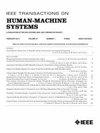Building Contextualized Trust Profiles in Conditionally Automated Driving
IF 4.4
3区 计算机科学
Q2 COMPUTER SCIENCE, ARTIFICIAL INTELLIGENCE
引用次数: 0
Abstract
Trust is crucial for ensuring the safety, security, and widespread adoption of automated vehicles (AVs), and if trust is lacking, drivers and the general public may hesitate to embrace this technology. This research seeks to investigate contextualized trust profiles in order to create personalized experiences for drivers in AVs with varying levels of reliability. A driving simulator experiment involving 70 participants revealed three distinct contextualized trust profiles (i.e.,在有条件自动驾驶中建立情境化信任档案
信任对于确保自动驾驶汽车(AVs)的安全可靠和广泛应用至关重要,如果缺乏信任,驾驶员和公众可能会对接受这项技术犹豫不决。本研究旨在调查情境化的信任特征,以便为驾驶者在不同可靠性水平的自动驾驶汽车中创造个性化体验。有 70 名参与者参加的驾驶模拟器实验通过 K-means 聚类发现了三种不同的情境化信任特征(即自信的副驾驶、近视的实用主义者和不情愿的自动驾驶者),并对驾驶者的动态信任、处置信任、初始学习信任、个性特征和情绪进行了分析。实验包括八个场景,要求参与者在三个条件下接管自动驾驶汽车的控制权:控制条件、误报条件和错过条件。为了验证模型,我们使用夏普利加法解释器构建了一个多二项逻辑回归模型,以确定在预测情境化信任档案时最有影响力的特征,该模型的 F1 分数为 0.90,准确率为 0.89。此外,对个体因素如何影响情境化信任档案的研究从以用户为中心的角度为信任动态提供了宝贵的见解。这项研究的成果对开发个性化车载信任监控和校准系统具有重要意义,可调节驾驶员的信任水平,从而提高自动驾驶的安全性和用户体验。
本文章由计算机程序翻译,如有差异,请以英文原文为准。
求助全文
约1分钟内获得全文
求助全文
来源期刊

IEEE Transactions on Human-Machine Systems
COMPUTER SCIENCE, ARTIFICIAL INTELLIGENCE-COMPUTER SCIENCE, CYBERNETICS
CiteScore
7.10
自引率
11.10%
发文量
136
期刊介绍:
The scope of the IEEE Transactions on Human-Machine Systems includes the fields of human machine systems. It covers human systems and human organizational interactions including cognitive ergonomics, system test and evaluation, and human information processing concerns in systems and organizations.
 求助内容:
求助内容: 应助结果提醒方式:
应助结果提醒方式:


